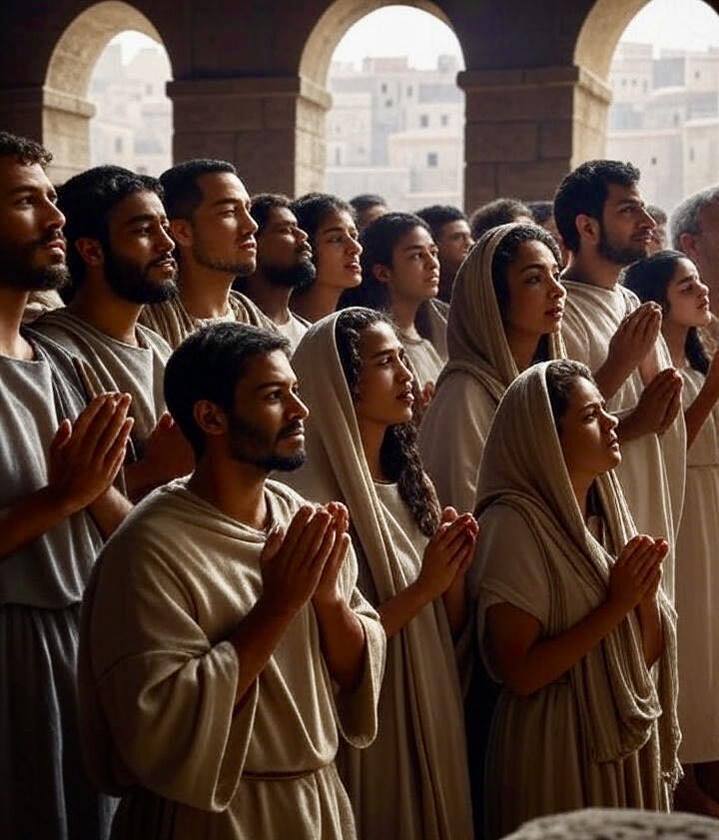Divine Alignment in Corinth: Paul’s Journey of Sovereignty, Support, and Bold Witness
Acts 18:1-4
"After this Paul left Athens and went to Corinth. And he found a Jew named Aquila, a native of Pontus, recently come from Italy with his wife Priscilla, because Claudius had commanded all the Jews to leave Rome. And he went to see them, and because he was of the same trade he stayed with them and worked, for they were tentmakers by trade. And he reasoned in the synagogue every Sabbath and tried to persuade Jews and Greeks."
This passage transitions from Paul’s time in Athens, where he encountered philosophical debates, to Corinth, a bustling, morally challenging city. Corinth was a Roman city of commerce, and linked to the temple of Aphrodite, which promoted ritual prostitution. The city’s proverb, "to live like a Corinthian," implied licentiousness, making it a challenging yet strategic mission field for the early church.
By working alongside Aquila and Priscilla, Paul supported himself, modeling humility and preventing accusations of greed. It’s not a separation of "secular" and "sacred" but an integration: work as a platform for witness. This prevented dependency on converts and allowed Paul to preach freely, especially in a city rife with exploitation. It also fosters community, sharing a trade-built trust and discipleship opportunities. In Corinth’s diverse, vice-filled environments, Paul’s persistence shows faith’s transformative power.
This passage underscores God’s sovereignty. A Roman edict, a shared trade, and a strategic city align for the advancement of the gospel.
Acts 18:5-6
When Silas and Timothy arrived from Macedonia, Paul was occupied with the word, testifying to the Jews that the Christ was Jesus. And when they [the Jews] opposed and reviled him, he shook out his garments and said to them, "Your blood be on your own heads! I am innocent. From now on I will go to the Gentiles."
Paul goes on to the home of a believer which was next door to the synagogue. And God gives Paul a word in a vision, encouraging him to continue in the way and witness to them more. Amid the potential fear of past persecutions by the Jews, and Corinth’s Roman immorality, God appears in a night vision to Paul. God is commanding Paul to cease his fearing and continue preaching.
Acts 18:9-10 God said to him:
"Do not be afraid, but go on speaking and do not be silent, for I am with you, and no one will attack you to harm you, for I have many in this city who are my people."
This reveals God’s sovereignty in election and protection, encouraging evangelism without diminishing human effort. And it addresses ministerial discouragements, reminding believers of God’s faithfulness in hostile settings. Promises that include divine presence ("I am with you," echoing Exodus 3:12; Joshua 1:5; Jeremiah 1:8), protection from attack and harm, and assurance of "many people" (elect yet to be called).
Theologically, this illustrates how God transforms potential discouragement into fruitful ministry, as Paul later reflects in his letters to the Corinthians. Paul is compelled by this divine vision to continue preaching in the synagogue. The Greek term sunecho (constrained or compelled) implies Paul was "wholly absorbed" or pressed by the Spirit. Indicating an intense, continuous drive to proclaim the gospel. He's instructed by The Spirit to testify solemnly, emphasizing an earnest, personal involvement in arguing from Scriptures that Jesus is the Messiah.
Unbelievers would say that these challenges are evidence of a silent absent God, an example of unanswered prayer. These people might say:
"Prayed for a miracle? Got radio silence? Believers call it "mystery." Skeptics call it evidence of absence. If God speaks only in subjective hunches, how’s that different from imagination?"
Critics often view unanswered prayer as empirical disproof, suggesting if God exists, prayers (e.g., for healing) should yield verifiable results; silence in this manner implies absence or indifference, as far as they see it. For instance, some assert it's deceptive to reframe "no response" as a divine "no," or that prayer studies show no effect beyond placebo. Believers counter that God isn’t a cosmic vending machine; prayers receive "yes," "no," or "wait" for greater purposes, fostering growth, faith, or alignment with His will. Silence invites deeper trust, as in Paul’s vision amid fear.
God speaks selectively for greater impact and builds character. Biblical "no’s" (e.g., Paul’s thorn, 2 Corinthians 12:7-9) yields greater glory; empirical demands miss prayer’s relational essence. In Acts’ context, Paul’s "unanswered" fears are met with a vision, transforming discouragement into fruit. Silence isn’t absence but sovereign timing. This trial cements Corinth as a gospel stronghold, a cultural Chrisitan hub, influencing Paul’s letters (1-2 Corinthians) on unity amid division. It reveals God’s election and protection (v.10), using Roman indifference to advance the church.
Unanswered prayer? Silence? The empirical evidence of God's sovereign will is the advancement of the church in Corinth. For the modern "silence," view it's an invitation to faith, not proof of absence. When you've heard His small still voice, you know God and His sovereign presence. You know Him because you love Him.
1 John 4:7
"Beloved, let us love one another, for love is from God, and whoever loves has been born of God and knows God."
If you can't hear Him, you're probably not in love with Him.
Amid life's transitions, this exemplifies living in God’s sovereign timing, where "silence" (delayed answers) invites deeper love and knowledge of Him. This is an invitation to draw closer not doubt His answers.
Paul Goes On Emboldened By A Word From God...
Silas and Timothy rejoin Paul after being left in Berea. Their arrival brings encouraging news from the Thessalonian church, and likely financial support from Philippi (answered prayer?). This marks a transition to full-time ministry, empowered by the Holy Spirit, showing how community support and divine urging enables bolder preaching.
Paul relocates to the home of Titius Justus (possibly Titus Justus, a God-fearer and Roman citizen), strategically adjacent to the synagogue to continue his outreach. Crispus, the synagogue leader (one Paul personally baptized, 1 Corinthians 1:14), converts with his family, influencing many Corinthians. Despite initial rejection, spiritual fruit emerges among the Jews (Crispus) and the Gentiles, fulfilling the gospel’s universal call. This integrates evangelism with community, as house churches form, and highlights baptism as a public commitment.
As Paul’s second missionary journey concludes with his return to Antioch and the launch of his third (Acts 18:18-23), the narrative shifts to Ephesus, introducing Apollos, a gifted preacher who bridges Jewish tradition and Christian faith. Apollos’s story complements Paul’s emboldenment: instructed by Priscilla and Aquila, he becomes a powerful apologist, showing how God’s word and community refine ministry for greater impact. And Apollos’s upgraded teaching bears fruit, strengthening the Corinthian church Paul founded. Paul’s emboldenment (v.9-10) via God’s word, Silas/Timothy’s support (v.5, divine provision from Philippi), and fruit like Crispus’s conversion shows how partial ministries mature through the Spirit and relationships, and how God answers prayers in ways we cannot fully understand.
Application Today:
Seek accurate teaching humbly; mentor others privately; trust God’s timing in provision, viewing "answered prayer" (like financial aid and fellowship with others preaching) as encouragement for bolder witness.
Here's where the unbeliever's doubts fail, Paul’s fruitful ministry in Corinth (Acts 18), stems from collective, persistent prayers, rather than solely isolated, insightful individual prayers. By the power of the corporate prayers of the church, Paul succeeded in forming partnerships with Aquila and Priscilla, conversions like Crispus and many Corinthians, and divine protection via a night vision. Answered prayers aren't measured in the individual situations, it is corporate. It ties to broader church dynamics. Thus, Corinth’s church growth (influencing 1-2 Corinthians) links to a network of "many prayers" from Antioch, Thessalonica, and beyond, not just Paul’s solo insight.
The book of Acts consistently portrays church growth as fueled by "many prayers" united, fervent, and often crisis-driven, over individual efforts alone. Unlike solitary prayer, group prayer unites believers, releasing collective faith. We see this time and time again. In Acts 4:24-31, after persecution, the church prays "with one accord," resulting in the place shaking, Holy Spirit filling, and bold preaching, directly preceding growth.
Corporate prayer combats isolation builds faith through testimony and reflects the Trinity’s communal nature. It substantiates claims that church success isn’t from lone visionaries but interdependent bodies.
In hostile settings (like Corinth’s vice), emulate Acts by prioritizing group prayer for boldness and protection. And love God to know His will. Group prayer isn’t magical but aligns us with God’s sovereignty. It invites the Holy Spirit’s empowerment, and provides accountability, it reveals His will through diverse perspectives. Loving God deepens this, as intimacy with Him sharpens our discernment. Knowing "His will" often emerges in community, where iron sharpens iron.
Proverbs 27:17
"Iron sharpens iron, and one man sharpens another."
For example, Paul’s "fear" (1 Corinthians 2:3) likely melted in community support, revealing God’s will through persistence. Divine silence can test our love, but group prayer combats this by sharing testimonies, and building collective trust. Cultivate that love via daily practices; scripture meditation, worship, service, and then extend that to small groups.
Acts 18 reminds us that the early church’s success wasn’t luck but Spirit-led prayerful unity. By prioritizing group prayer and loving God, we can navigate today’s "Corinths" with boldness, protection, and clear direction.
Prayer:
Heavenly Father, just as You sovereignly guided Paul through opposition and fear in Corinth, providing companions, protection, and a vision of Your presence, help us today to integrate our work and witness with humility and persistence. Compel us by Your Spirit to proclaim the Gospel boldly, trusting in Your promise that You are with us and have many yet to call.
In Jesus’ Holy name, Amen.




















